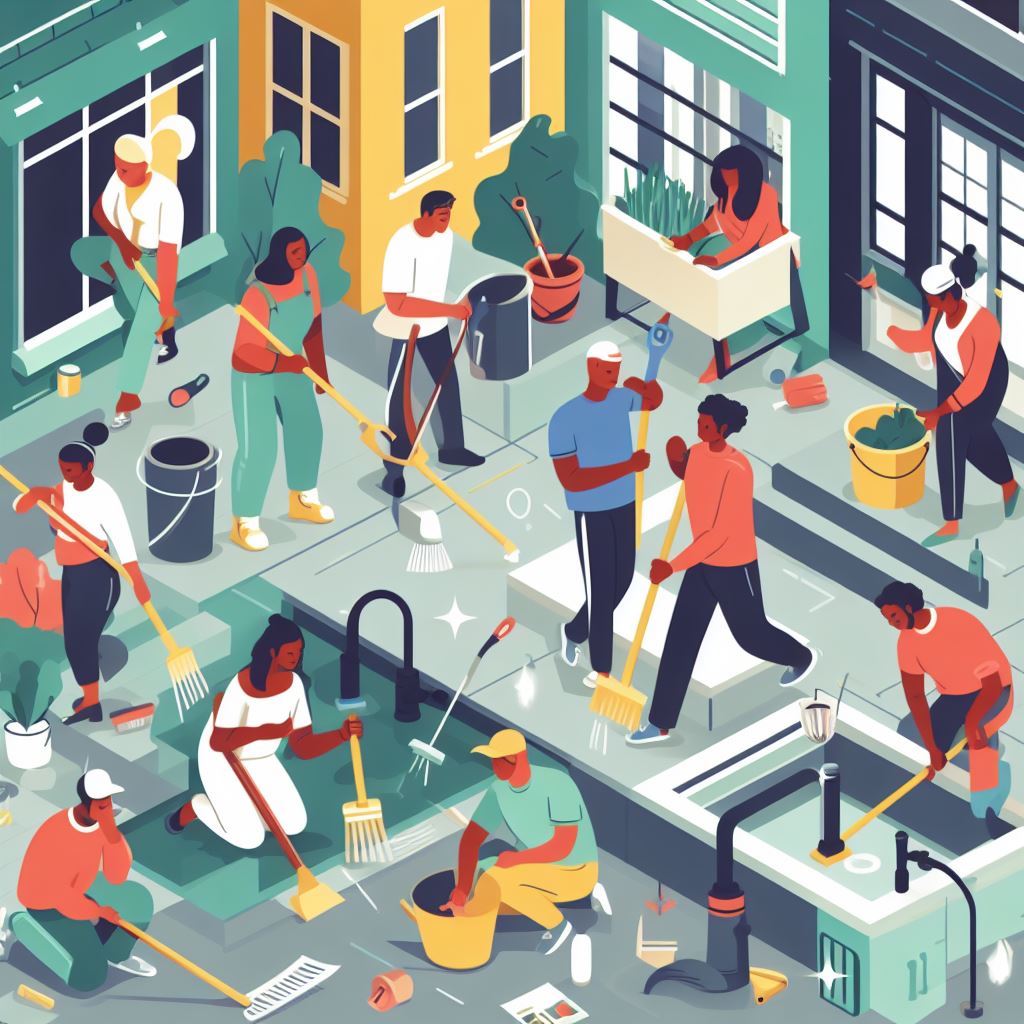13 Essential Maintenance Duties for Subsidized Housing Tenants

Are you a subsidized housing tenant? Wondering what maintenance duties are expected of you? Look no further!
In this article, we’ll outline the 13 essential tasks you should be aware of, so you can keep your unit in tip-top shape.
From cleanliness and hygiene to reporting safety hazards, we’ve got you covered.
Follow these guidelines, and you’ll be on your way to maintaining a comfortable and safe living environment for yourself and your fellow tenants.
Key Takeaways
- Regularly clean and maintain the subsidized housing unit, including appliances like the refrigerator, dishwasher, oven, and air conditioner.
- Practice proper waste management and recycling by following local guidelines for separating recyclables from regular trash, disposing of trash and recycling in designated bins, rinsing food containers before recycling, and flattening cardboard boxes.
- Conduct regular home maintenance tasks such as inspecting faucets, showerheads, and pipes for leaks, promptly fixing any leaks to avoid water waste and higher bills, clearing clogs using non-chemical methods, and weatherproofing windows and doors to improve energy efficiency.
- Report concerns regarding cleanliness or hygiene, pest infestations, fire hazards, structural issues, plumbing and gas leaks, trip hazards, and damage to outdoor structures to appropriate authorities for timely repairs and maintenance.
Maintain Cleanliness and Hygiene
- You must regularly clean and maintain your subsidized housing unit to ensure cleanliness and hygiene standards are met. Keeping your living space clean isn’t only essential for your health and well-being but also for the overall upkeep of the community. Start by creating a cleaning routine that includes tasks such as sweeping and mopping the floors, wiping down surfaces, and disinfecting commonly used areas like the kitchen and bathroom. Make sure to regularly vacuum carpets and rugs to remove dust and allergens.
- It’s important to properly dispose of garbage and waste by using designated bins or recycling facilities. Avoid leaving trash outside your unit, as it can attract pests and create an unsightly environment. Additionally, regularly inspect and maintain plumbing fixtures to prevent leaks or clogs. Report any maintenance issues to the housing management as soon as possible.
- Personal hygiene is also crucial in maintaining a clean living environment. Keep yourself and your belongings clean by regularly washing your hands, showering or bathing, and laundering your clothes and bedding. Properly store toiletries and cleaning supplies to minimize clutter and maintain a tidy space.
- Remember, cleanliness is a shared responsibility among all tenants. Be considerate of your neighbors by keeping noise levels down during designated quiet hours and promptly reporting any concerns regarding cleanliness or hygiene to the housing management. By taking these measures, you contribute to creating a pleasant and healthy living environment for everyone in the subsidized housing community.
Regularly Dispose of Trash and Recycling
When it comes to maintaining a clean and organized living space in subsidized housing, regularly disposing of trash and recycling is essential.
Proper recycling practices not only help protect the environment but also contribute to the overall cleanliness of the community.
To ensure efficient waste management, it’s important to follow local guidelines for separating recyclables from regular trash and to dispose of them in the designated bins or containers.
Recycling Best Practices
To ensure proper waste management in subsidized housing, it’s essential that you regularly dispose of both trash and recycling. Recycling best practices are crucial for reducing environmental impact and conserving resources. Start by familiarizing yourself with the recycling guidelines provided by your housing management or local municipality.
Separate recyclable materials such as paper, plastic, glass, and metal into designated bins. Rinse food containers before recycling to prevent contamination. Flatten cardboard boxes to save space. Remove any non-recyclable items, such as plastic bags or Styrofoam, from the recycling bin.
Remember to empty and clean your recycling bin regularly to prevent odors and pests. By following these practices, you contribute to a cleaner and greener living environment for yourself and your community.
Waste Management Tips
Dispose of your trash and recycling regularly to maintain a clean and sustainable living environment in subsidized housing.
Here are some waste management tips to help you keep your living space tidy and eco-friendly:
- Separate your trash and recycling: Use separate containers or bags to keep recyclable items separate from regular trash.
- Follow recycling guidelines: Make sure to rinse out containers, remove lids, and flatten cardboard boxes before placing them in the recycling bin.
- Use proper disposal methods: Dispose of hazardous waste, such as batteries and electronics, at designated drop-off locations to prevent environmental harm.
- Reduce waste: Practice mindful consumption by buying only what you need and opting for reusable items whenever possible.
Keep Common Areas Clean and Organized
Ensure that you clean and organize the common areas of the subsidized housing complex regularly. By doing so, you contribute to maintaining a pleasant and comfortable living environment for everyone in the community. Here are some essential tips to help you keep the common areas clean and organized.
Firstly, make sure to clean up after yourself whenever you use the common areas. If you spill something or leave behind any trash, take responsibility and clean it up promptly. This includes wiping down surfaces, picking up litter, and disposing of any waste properly.
Secondly, be mindful of the items you bring into the common areas. Avoid cluttering the space with personal belongings or leaving them unattended. If you notice any items left behind by others, it’s courteous to inform the management or place them in a designated lost and found area.
Thirdly, maintain a respectful attitude towards shared spaces. Avoid excessive noise, vandalism, or any behavior that may disrupt the peaceful coexistence of tenants. If you witness any damage or misuse of the common areas, report it to the appropriate authorities.
Lastly, consider organizing community cleaning events or forming a cleaning schedule with other tenants. By working together, you can ensure that the common areas receive regular attention and stay clean for everyone to enjoy.
Take Care of Your Unit’s Appliances
When it comes to maintaining your unit’s appliances, regular maintenance is crucial. As a tenant, it’s your responsibility to take care of the appliances provided to you. This includes cleaning them regularly, following the manufacturer’s instructions, and promptly reporting any issues to the maintenance staff.
Regular Appliance Maintenance
Take responsibility for maintaining your unit’s appliances to ensure their longevity and proper functionality. Regular appliance maintenance is essential to avoid costly repairs and replacements.
Follow these simple steps to keep your appliances in top shape:
- Clean your refrigerator coils at least twice a year. Dust and debris can accumulate on the coils, making your fridge work harder and reducing its efficiency. Use a brush or vacuum to remove the buildup.
- Check and clean your dishwasher filters regularly. Clogged filters can affect the dishwasher’s performance and cause unpleasant odors. Remove the filters, rinse them under running water, and reinstall them.
- Clean your oven regularly to prevent the buildup of grease and food particles. Use a non-abrasive cleaner and a soft cloth to wipe the interior and the door.
- Check and replace the filters in your air conditioner regularly. Clean filters improve the air quality and increase the efficiency of your unit.
Tenant Responsibilities for Appliances
To properly maintain your unit’s appliances, it’s important for you to fulfill your responsibilities as a tenant. Taking care of the appliances not only ensures their longevity but also helps you avoid unnecessary repair costs.
Firstly, make sure to clean the appliances regularly. For refrigerators, remove any expired food, wipe down the shelves, and defrost when necessary. When it comes to ovens and stoves, clean up spills and grease immediately to prevent damage and stains. Additionally, regularly clean the filters of your air conditioner to maintain its efficiency.
Secondly, be mindful of how you use the appliances. Avoid overloading the washing machine or dishwasher, as this can strain the motors.
Properly Maintain Plumbing Fixtures
To ensure the proper functioning of plumbing fixtures, you should regularly inspect and maintain them. Here are four important steps to follow in order to properly maintain your plumbing fixtures:
- Check for leaks: Inspect all faucets, showerheads, and pipes for any signs of leakage. Even a small drip can waste a significant amount of water over time and lead to higher water bills. If you notice any leaks, make sure to fix them promptly.
- Clear clogs: Over time, drains can become clogged with hair, soap residue, and other debris. Use a plunger or a drain snake to remove any blockages. Avoid using chemical drain cleaners, as they can damage the pipes.
- Clean aerators and showerheads: Mineral deposits can build up in aerators and showerheads, affecting water flow. Regularly remove them and soak them in vinegar to dissolve the deposits. Scrub them gently with a toothbrush to remove any remaining residue.
- Maintain toilets: Check toilets for any signs of leaks or running water. A running toilet can waste a significant amount of water. If you notice any issues, replace faulty parts or call a professional plumber for assistance.
Keep Windows and Doors in Good Condition
To keep your windows and doors in good condition, there are two important points to consider.
First, weatherproofing is essential for energy efficiency and to prevent drafts. Make sure to seal any gaps or cracks around your windows and doors to keep the cold air out in the winter and the hot air out in the summer.
Second, it’s crucial to prioritize safety measures for tenants. Ensure that your windows and doors are secure and have working locks to protect against potential break-ins.
Weatherproofing for Energy Efficiency
Maintain the efficiency of your subsidized housing by regularly inspecting and maintaining the condition of your windows and doors.
To ensure optimal energy efficiency and weatherproofing, follow these four steps:
- Check for any cracks or gaps around windows and doors. Use weatherstripping or caulking to seal any openings and prevent drafts.
- Inspect the condition of window frames and sills. Repair or replace any damaged or rotting wood to prevent moisture infiltration and further deterioration.
- Install window film or blinds to reduce heat transfer and block harmful UV rays. This will help regulate indoor temperatures and protect your belongings from sun damage.
- Consider upgrading to energy-efficient windows and doors. Look for products with high insulation ratings and low emissivity glass to maximize energy savings.
By properly maintaining your windows and doors, you can enhance energy efficiency, minimize energy bills, and create a comfortable living environment.
Now, let’s move on to discussing important safety measures for tenants.
Safety Measures for Tenants
Ensure the safety of your subsidized housing by keeping your windows and doors in good condition. Properly functioning windows and doors are essential for maintaining a secure living environment. Regularly inspect them for any damage or wear and tear. Make sure that the locks are in working order and replace them if necessary. Ensure that all windows and doors close tightly and securely, as gaps or cracks can compromise your safety. If you notice any issues, such as broken glass or loose hinges, report them to your housing management immediately.
Additionally, consider installing additional security measures, such as window and door alarms or security cameras, to further enhance the safety of your home. By taking these measures, you can help protect yourself and your fellow tenants from potential security risks.
To continue ensuring your safety and well-being, it’s crucial to report any pest infestations promptly.
Report Any Pest Infestations Promptly
If you notice any pest infestations in your subsidized housing unit, it’s important to promptly report them to the appropriate authorities. Not only can pests cause damage to your living space, but they can also pose health risks to you and your neighbors. By reporting pest infestations promptly, you can help prevent the problem from worsening and ensure that necessary measures are taken to address it.
Here are four reasons why reporting pest infestations is crucial:
- Prevent further damage: Pests like rodents and insects can chew through wires, insulation, and even structural materials, causing significant damage to your unit. By reporting infestations early on, repairs can be made promptly, preventing further deterioration.
- Protect your health: Pests can carry diseases and allergens, which can pose serious health risks. Prompt reporting allows for proper extermination and sanitation measures to be implemented, reducing the risk of illness for you and your neighbors.
- Stop the spread: Pests can multiply rapidly and spread to neighboring units if left unchecked. Reporting infestations promptly helps containment efforts and prevents the problem from affecting others.
- Maintain a comfortable living environment: Living with pests can be stressful and uncomfortable. By reporting infestations promptly, you can ensure that the necessary steps are taken to eliminate pests and restore a safe and pleasant living environment for everyone.
Replace Burnt-Out Light Bulbs
To maintain a well-lit living space, promptly replace any burnt-out light bulbs in your subsidized housing unit. Adequate lighting is essential for creating a comfortable and safe environment. By ensuring that all light bulbs are in working order, you can improve visibility and prevent accidents. Here are some simple steps to follow when replacing burnt-out light bulbs:
| Step | Instructions |
|---|---|
| 1 | Turn off the light switch |
| 2 | Allow the bulb to cool down |
| 3 | Carefully remove the old bulb |
| 4 | Insert and screw in the new bulb |
| 5 | Turn on the light switch to test the new bulb |
Remember to use the appropriate type and wattage of bulbs recommended for your fixtures. Regularly checking and replacing burnt-out bulbs will not only improve the overall ambiance of your living space but also help you save on energy costs.
Now that you know how to replace burnt-out light bulbs, let’s move on to the next important maintenance duty: taking care of flooring and walls.
Take Care of Flooring and Walls
Maintain the cleanliness and condition of your flooring and walls in your subsidized housing unit to create a comfortable and visually appealing living space. Taking care of your flooring and walls not only enhances the overall aesthetics of your home but also prolongs their lifespan.
Here are some essential maintenance duties to keep in mind:
- Regular cleaning: Sweep or vacuum your floors to remove dirt, dust, and debris. Wipe down walls with a damp cloth to remove any marks or stains. This simple routine will help prevent damage and maintain the appearance of your surfaces.
- Preventive measures: Use rugs or doormats in high-traffic areas to minimize wear and tear on your flooring. Place protective pads under furniture legs to prevent scratches on your floors and walls. Additionally, avoid hanging heavy objects directly on the walls to prevent damage.
- Address spills and stains promptly: Accidents happen, but it’s important to clean up spills and stains as soon as possible. Use appropriate cleaning solutions and techniques recommended for your specific flooring and wall materials.
- Regular maintenance and repairs: Inspect your flooring and walls regularly for any signs of damage, such as cracks, peeling paint, or loose tiles. Address these issues promptly to prevent further deterioration and potential safety hazards.
Clean and Maintain Heating and Cooling Systems
To ensure the functionality and longevity of your heating and cooling systems, take responsibility for cleaning and maintaining them in your subsidized housing unit. Regular maintenance of these systems not only improves their efficiency but also helps prevent breakdowns and costly repairs. Here are some essential tasks you should perform:
| Task | Frequency |
|---|---|
| Clean or replace air filters | Every 1-3 months |
| Check and clean the outdoor condenser unit | Annually |
| Clear debris from vents and ducts | Annually |
| Schedule professional maintenance | Twice a year |
Cleaning or replacing air filters is crucial as dirty filters restrict airflow and reduce the system’s efficiency. Checking and cleaning the outdoor condenser unit is necessary to remove leaves, dirt, and debris that can obstruct airflow. Clearing debris from vents and ducts prevents blockages and ensures proper air circulation. It is also advisable to schedule professional maintenance at least twice a year to inspect, clean, and tune-up the system for optimal performance.
Report Any Safety Hazards Immediately
If you notice any safety hazards, promptly report them to the appropriate authorities. Ensuring the safety of your subsidized housing is essential for both your well-being and the well-being of your fellow tenants. Here are some safety hazards that you should be aware of and report immediately:
- Fire hazards: Look out for frayed electrical wires, overloaded outlets, and malfunctioning smoke detectors. These can pose a significant risk of fire and should be reported to the housing management or the fire department.
- Structural issues: Cracks in walls or ceilings, sagging floors, or loose handrails can indicate potential structural problems. These issues can jeopardize the stability of the building and should be reported to the appropriate authorities as soon as possible.
- Plumbing and gas leaks: If you notice leaks from pipes, faucets, or gas lines, report them immediately. Leaks can cause water damage, mold growth, and even lead to gas poisoning or explosions.
- Trip hazards: Broken or uneven sidewalks, loose steps, or damaged flooring can cause accidents and injuries. Report these hazards to the maintenance staff or the housing management for prompt repairs.
Maintain Outdoor Areas and Landscaping
You can contribute to the overall safety and appeal of your subsidized housing by taking care of the outdoor areas and landscaping. Maintaining these areas not only enhances the aesthetic appeal of your community but also ensures a safe and pleasant environment for everyone.
Here are some essential maintenance duties to keep in mind:
- Regularly mow the lawn: Keeping the grass trimmed not only improves the overall appearance of the outdoor areas but also prevents overgrowth that could attract pests or pose a tripping hazard.
- Remove debris: Regularly remove any fallen branches, leaves, or other debris from the outdoor areas. This helps prevent accidents and maintains a clean and inviting atmosphere.
- Water plants and flowers: If your subsidized housing has an outdoor garden or flower beds, make sure to water them regularly. Proper hydration promotes healthy growth and vibrant colors.
- Weed control: Keep an eye out for weeds in the outdoor areas and promptly remove them. Weeds not only detract from the overall appearance but can also compete with other plants for nutrients and water.
- Report any damage: If you notice any damage to outdoor structures, such as fences or walkways, report it to the management immediately. Timely repairs help maintain the safety and functionality of these areas.
Follow Property Rules and Regulations
Continue contributing to the overall safety and appeal of your subsidized housing by adhering to the property rules and regulations. By following these guidelines, you not only ensure a harmonious living environment but also help maintain the quality of your housing community.
Here are four important rules and regulations to keep in mind:
- Noise Control: Respect your neighbors by keeping noise levels to a minimum. Avoid loud music, excessive conversations, or any other activities that may disturb others, particularly during quiet hours.
- Pet Policies: If pets are allowed in your subsidized housing, make sure to comply with all pet-related rules. This may include leash requirements, waste cleanup, and restrictions on aggressive breeds.
- Parking Guidelines: Familiarize yourself with the parking rules and regulations. Park only in designated areas and avoid blocking driveways or emergency exits. If there’s a visitor parking policy, ensure that your guests adhere to it as well.
- Waste Disposal: Properly dispose of your garbage and recycling following the property’s guidelines. Use designated bins and avoid leaving trash in common areas or outside of designated hours.
Frequently Asked Questions
How Often Should Tenants Clean Their Units’ Appliances?
You should clean your unit’s appliances regularly to ensure they are working properly. Regular cleaning helps prevent buildup of dirt and grime, leading to better performance and longevity of your appliances.
What Should Tenants Do if They Notice a Safety Hazard in the Common Areas?
If you notice a safety hazard in the common areas, you should report it immediately to the housing management. They will take the necessary steps to address the issue and ensure the safety of all residents.
Are Tenants Responsible for Maintaining the Outdoor Areas and Landscaping, or Is That the Responsibility of the Property Management?
You are responsible for maintaining the outdoor areas and landscaping in subsidized housing. It is your duty as a tenant to keep these areas clean and presentable. Property management may assist but the primary responsibility lies with you.
Can Tenants Be Fined for Not Following Property Rules and Regulations?
Yes, tenants can be fined for not following property rules and regulations. It is important to adhere to the guidelines set by the property management to maintain a safe and harmonious living environment.
How Should Tenants Report Pest Infestations to the Property Management?
To report pest infestations to property management, you should contact them immediately. Provide specific details about the problem and the location. They will take necessary steps to resolve the issue and ensure a safe living environment for all tenants.



